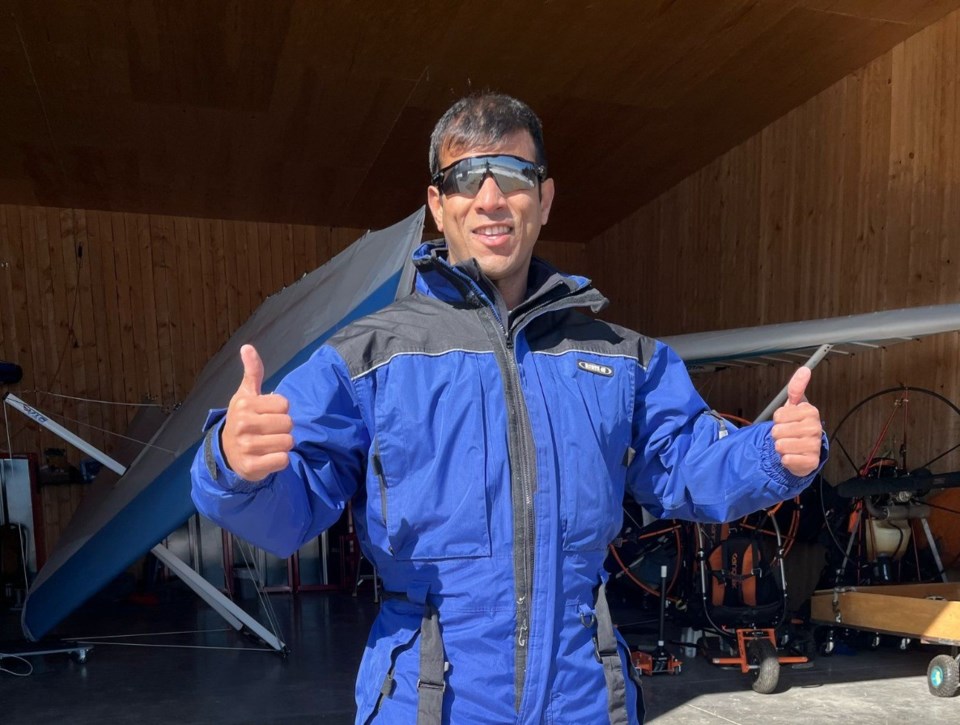For Ishan Tewari, flying is more than a business—it’s a calling for which he has set aside multiple high-paying, stable careers.
The former Indian Navy officer and newly minted Pemberton resident is the founder and chief instructor behind Whistler Sky Sports, a new ultralight and power hang-gliding flight school launching this fall from the Pemberton Airport.
It’s been a long road to get to Pemberton. But he told Pique that residents’ appetite for adrenaline and exploration is what ultimately drew him to this corner of the planet.
“You talk about skiing, you talk about snowboarding, you talk about different kinds of sports,” Tewari said. “What is it that is common? That people here are willing to go out and do these things, right? It is a community of extreme sports people.”
In the Navy
Tewari’s journey to aviation started, improbably, in the Indian Naval Academy.
“We had these different clubs—arts, culinary, music, dance—and I chose the paragliding club,” he explained.
An end-of-term paragliding session lit the fuse for him. He recalled spending five, six hours flying off the Vagamon mountain in the Kerala state. Ten years in the Navy—where he served as an electrical officer and deep-sea diver—never dulled that initial spark. He even started to expand into more extreme iterations of the sport.
“I started doing power flying,” he recalled. “Same paragliding setup, but with a 30-kilo motor on your back. You can take off from a flat field—football field size. No mountain needed.”
Still, despite that passion, Tewari’s career nearly took another direction entirely. After leaving the Navy in 2022 against the wishes of his family, he applied to Harvard University and earned a master’s degree in international business. And while he’d received a handful of promising job offers—including one in San Francisco managing a multi-million dollar EV depot—none ultimately piqued his interest.
“The pay was very good, I will not deny,” he said. “But with the long hours, I was like, ‘If I have to work so much, why should I not work for myself?’”
His initial idea was to try to challenge a provincial power monopoly in New Brunswick, offering remote communities access to renewable energy sources on independent grids. During his final semesters at Harvard, he developed a business plan, started consulting with these communities and lined up investors. But he knew his passion lay elsewhere.
“I figured I would do part-time flying. I will not generate money out of it, but it will be like an equilibrium where my expenses would be covered by the business and I could fly on the side,” he said.
“But I came to a point where I wanted to do something which generates money and is also able to cater to what my passion [is].”
So, after speaking with his business mentors, he started looking for an established resort town with an airstrip, mountain ranges that could accommodate paragliding and a community of like-minded adventurers.
In June, he moved to Pemberton—close enough to Whistler to access its tourists but in a town that possessed the flying infrastructure he needed.
Building an airstrip dream
In March 2024, Tewari began working with the Village of Pemberton (VOP) and the Pemberton Airport to secure permits for Whistler Sky Sports.
“They have been super helpful with me,” he said, singling out the VOP's director of corporate and legislative services Gwendolyn Kennedy and deputy corporate officer Elena Aranguren. “They have gone out of their way to help me.”
Unlike a typical adventure outfit, Whistler Sky Sports operates as a Transport Canada–certified flight school, where even a 15-minute intro ride is considered a flight lesson.
“There is no joyride as such,” Tewari explained. “Though it is a joyful way to spend your time, you also get to learn something with that.”
That means hands-on controls, cockpit briefings and an intro to mountain flying physics—how thermals rise, how lift bands form, and why birds with open wings mean good air.
“Even if you are going for an introductory flight, you should think of it as a learning,” he said. “Those flights are like tasters. You get a taste of what flying is all about.”
The school’s two ultralight aircraft—an open-cockpit trike and a closed-cockpit RANS S-6 Coyote II—are currently stationed in Calgary, awaiting transport west. Full programming is expected to begin mid-September.
Despite his rigorous safety-first mindset, Tewari has had a few close calls. He once crashed into a river in India with a paramotor on his back—only surviving thanks to his naval diving training and a well-timed rope rescue by local police.
“I figured I had already lost my life,” he said of the incident. “So I learned it’s better to learn from others’ mistakes rather than doing it yourself, because you don’t get many chances up in there.”
In addition to passing on the knowledge he’s gained over more than a decade of aviation, his ultimate hope is that Whistler Sky Sports will help turn Pemberton—not Whistler—into “the true adventure capital” of the Sea to Sky.
“The signs as you drive in, ‘Adventure begins here,’” he noted. “I really want to help make it true.”




